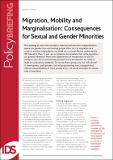| dc.contributor.author | Wood, S | |
| dc.coverage.spatial | Brazil | en |
| dc.coverage.spatial | Ethiopia | en |
| dc.coverage.spatial | India | en |
| dc.coverage.spatial | the Philippines | en |
| dc.coverage.spatial | South Africa | en |
| dc.date.accessioned | 2016-05-23T14:57:59Z | |
| dc.date.available | 2016-05-23T14:57:59Z | |
| dc.date.issued | 2016-05 | |
| dc.identifier.citation | Wood, S. (2016) 'Migration, Mobility and Marginalisation: Consequences for Sexual and Gender Minorities', IDS Policy Briefing 118, Brighton: IDS | en |
| dc.identifier.uri | https://opendocs.ids.ac.uk/opendocs/handle/20.500.12413/11632 | |
| dc.description.abstract | As a strategy to avoid discrimination, violence and economic marginalisation, sexual and gender non-conforming people often turn to migration as a route to achieve independence and build social capital. Recent studies by the IDS Sexuality, Poverty and Law programme demonstrate that while migration can provide liberation from some experiences of marginalisation and an ability to contribute economically towards family households, for many it leads to a precarious existence. To ensure these groups are not ‘left behind’ in development, policymakers and aid programming must recognise and
address marginalisation of these groups as part of overall strategies to reduce risks of migration. | en |
| dc.description.sponsorship | UK Department for International Development | en |
| dc.language.iso | en | en |
| dc.publisher | IDS | en |
| dc.relation.ispartofseries | IDS Policy Briefing;118 | |
| dc.rights.uri | http://creativecommons.org/licenses/by/3.0/ | en |
| dc.subject | Gender | en |
| dc.subject | Migration | en |
| dc.subject | Sexuality and Development | en |
| dc.title | Migration, Mobility and Marginalisation: Consequences for Sexual and Gender Minorities | en |
| dc.type | IDS Policy Briefing | en |
| dc.rights.holder | IDS | en |
| dc.identifier.ag | OT/11009/6/1/4/605 | |


